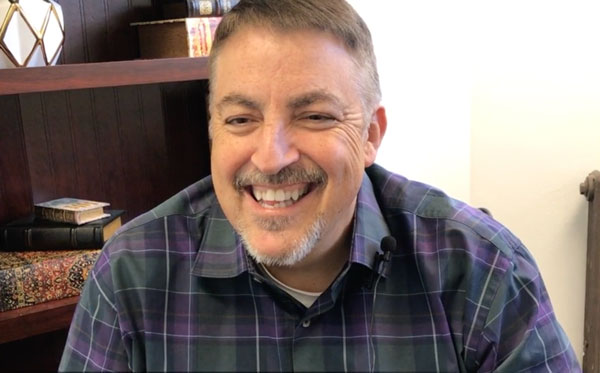In the spirit of Let’s #TalkAboutAphasia, the National Aphasia Association‘s nationwide aphasia awareness campaign, we wanted to do just that — talk about aphasia — but we also wanted to ensure the voices of people with aphasia were part of our conversation. Which is why we launched a video series called In Their Words: Aphasia Experiences.
In part 2 of our series, Cris discusses his experiences with aphasia — how life has changed, some of his challenges as well as triumphs — and the one thing he would like people to know about aphasia. Cris also experiences apraxia, which often affects people after a stroke similar to aphasia, but is an impaired ability to plan movements for speech.
(Turn on closed captioning by clicking the CC button on the bottom menu and selecting English or scroll down for a transcript.)
Video Transcript
– Hi.
– [Interviewer] Hello Cris.
– Hi.
– [Interviewer] We have a question to ask you about your aphasia.
– Sure.
– [Interviewer] What are some challenges that you’ve faced since you’ve had your aphasia?
– It impacted me quite in many ways. Really my relationship with my peers at work, and my family, my co-workers have been affected by my aphasia.
– [Interviewer] Okay, thank you. What are some successes that you’ve experienced since you’ve had your aphasia and/or apraxia?
– I really need to concentrate on what I am saying. I have to plan my speech a little bit more, slowing it down and making myself more clear are some of the techniques I’ve used to deal with the aphasia.
– [Interviewer] Very good. Thank you. And what’s the one thing you want people to know about aphasia?
– It’s be calm, be poised when you can. Slow your speech down. Make sure you’re clear with everyone and make sure everyone gives you the time to finish your sentences.
– [Interviewer] Very interesting. Thank you very much.
– You bet.
About the In Their Words Series
In the series, we ask our current and former clients and care partners to talk about their experiences with aphasia — the good, the bad, and the sometimes surprising.
The brief videos (3 minutes or less) are shot informally, and we asked our participants to communicate freely about aphasia from their perspective. Some opted to write and then read from their prepared statements. Others preferred more interview style-interactions for the videos.
Please help spread the word about aphasia — share these videos and help get the conversation started.
Click here for all of the videos:
In Their Words Playlist
Are You Dealing with Language Loss After a Stroke?
To learn more about UMAP and what we might be able to do for you or your loved one, call (734) 764-8440 or email ucll@umich.edu to get the conversation started.

